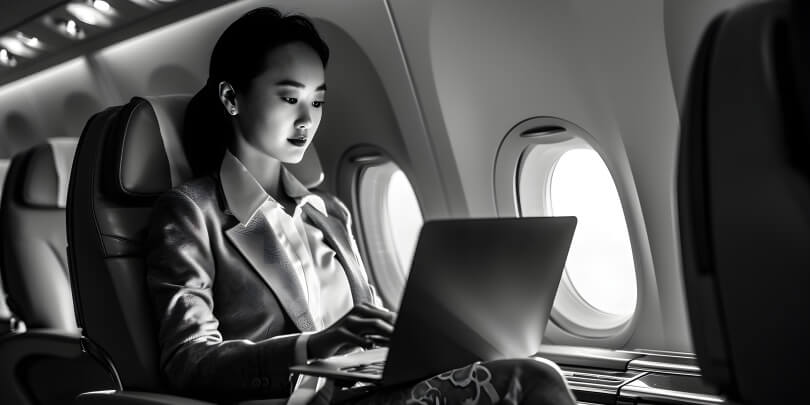Table of Contents
The Psychological Interpretation of Dreaming About Being a Passenger on an Airplane

Exploring the Symbolism of Airplanes in Dreams
Dreams about passenger airplanes often encapsulate deep-seated themes of trust and dependency, freedom, and personal ambition. When we analyze such dreams, we uncover layers of meaning that speak to our unconscious thoughts and feelings. Let’s delve into the symbolism of airplanes in dreams and the insights they can provide.
Airplanes in dreams generally symbolize rapid transitions, high aspirations, and even escape. They can also reflect a person’s desire for freedom and independence. These symbols are distinct from other common transportation dreams, such as cars or trains, which often represent more controlled or methodical progress. Airplanes, by contrast, indicate a leap towards something new, something beyond the current circumstances.
- Freedom: Flying high represents the desire to break free from constraints.
- Transition: Air travel signifies major changes or transitions happening in one’s life.
- High Aspirations: The act of flying suggests aiming for goals that are lofty and ambitious.
Specific symbolism of airplanes: freedom, transition, and high aspirations
A frequent flyer once shared their dream of being on a turbulent airplane flight. Upon analyzing the dream, it became evident that the turbulence symbolized the challenges and uncertainties they were facing in their career. The airplane itself represented their ambitious aspirations and the need to trust the journey despite its uncertainties. This dream highlighted not only the individual’s professional trust and dependency on external factors but also their intrinsic drive to achieve their goals.
Exploring such dreams provides valuable insights. Dreams about passenger airplanes compel us to consider our own feelings of trust and dependency in our personal and professional lives. They urge us to reflect on our aspirations and the transitions we are undergoing. Whether it is a sudden career shift or a longing for personal growth, these dreams act as a mirror to our subconscious, offering guidance and profound understanding.
In conclusion, the symbolism of airplanes in dreams is multifaceted and deeply tied to our waking lives. Recognizing and analyzing these symbols can offer significant insights into our ambitions, transitions, and desires for freedom. By understanding the context and emotions tied to these dreams, we can better navigate the challenges and opportunities we face in our waking lives.
Understanding the Role of Passengers in Dreams
Dreams about airplanes often carry profound psychological significance, particularly when one dreams of being a passenger. Examining these passenger airplane dreams can reveal much about an individual’s feelings of trust and dependency, and their perceptions of control in their waking life. When we look closely at the intricate layers of dream analysis, it becomes clear that being a passenger in a dream suggests a variety of psychological undertones.
- Firstly, passenger airplane dreams often symbolize a relinquishment of control, suggesting the dreamer may feel they are not in charge of certain aspects of their life. This sense of dependency can be linked to how they perceive their relationships or current life circumstances.
- Secondly, such dreams imply a significant degree of trust in others. In order to be a passenger, one must trust the pilot and the condition of the airplane itself. Thus, dreaming of being a passenger can indicate where trust exists or is lacking in the dreamer’s awake interactions and situations.
- Lastly, these dreams highlight the balance between agency and submission. They reveal the dreamer’s inner conflict about whether to assert control or to surrender to life’s unfolding events.
Differentiating Between Piloting and Being a Passenger
The differences between dreams where one is piloting an airplane and dreams of being a passenger are critical to understanding the dreamer’s psyche. When a person dreams of piloting, it often denotes a strong sense of responsibility and a desire for control. Conversely, as emphasized in passenger airplane dreams, being a passenger signifies a willingness to let go and depend on others.
Dream analysis shows these variations highlight contrasting aspects of the individual’s inner life. A dreamer who transitions from piloting to becoming a passenger might experience significant life changes, prompting a shift in how they view their personal power and autonomy. This shift can point towards a life period where letting go of stringent control brings emotional relief and a new understanding of trust and dependency.
Practical Example of a Dreamer’s Shift
Consider the case of a dreamer named Sarah, who consistently dreamt of piloting an airplane. This dream manifested during a period where she managed several high-pressure projects at work. As her life changed, and she faced a long-term health condition, her dreams shifted towards being a passenger airplane. This transition in her dreamscape reflected her waking acceptance of relying on others for support during her healing journey. Through this new perspective, Sarah found her dreams served as a potent commentary on her evolving perceptions of trust and dependency.
This example illustrates how dreams can be a mirror to our inner transformations, offering insights into how we balance control and trust within our lives. Dreams about airplanes, particularly those which involve being a passenger, continue to be a fertile ground for rich psychological interpretation, reinforcing that our dream worlds closely parallel our waking realities.
Trust and Dependency in the Context of Dreaming About Being a Passenger on an Airplane

Trust Dynamics Reflected in Airplane Passenger Dreams
Dreams involving passenger airplanes often reveal profound insights about trust and dependency in both personal and professional contexts. When analyzing passenger airplane dreams, it becomes essential to understand the underlying dynamics of relying on others and trusting oneself, as well as confronting the unknown.
In these dreams, finding oneself as a passenger rather than a pilot can symbolize a relinquishment of control and indicate one’s level of trust in others. This is particularly profound in scenarios where the dreamer must rely on the skills and decisions of the pilot, reflecting real-life situations where trusting others’ abilities and intentions becomes paramount. The feelings experienced in these dreams – whether anxiety, calmness, or excitement – can offer valuable clues about the individual’s subconscious views on dependency and self-trust. For instance, feeling at ease may suggest a healthy level of trust in one’s personal or professional relationships, while feelings of unease could point to underlying concerns and insecurities.
- Recognizing the aircraft’s condition and the pilot’s demeanor can further reveal specific aspects of the dreamer’s trust levels.
- The dream’s context, such as a smooth flight or turbulent weather, can denote the perceived stability and challenges in relationships.
- Awareness of other passengers can reflect the dreamer’s concerns about group dynamics and collective trust.
Interpreting Airplane Passenger Dreams in Relationships
In personal and professional relationships, passenger airplane dreams can serve as a metaphor for one’s trust dynamics. For example, dreaming of sitting in an airplane during a significant life event like a company merger can indicate how a person perceives their role within a larger system. If a manager dreams of being a passenger, it might symbolize his or her trust in the leadership overseeing the merger, reflecting feelings of dependency and confidence in their decision-making abilities.
Consider a manager who dreams of being a passenger on a flight amidst turbulent weather during a company merger. This dream could symbolize their anxieties about the uncertain aspects of the merger, as well as their trust – or lack thereof – in the higher-ups who are navigating these changes. Conversely, if the flight were smooth, it could imply a strong sense of trust in the organizational leadership and optimism about the transition’s outcome.
- A seamless flight can symbolize trust in leadership and confidence in positive outcomes.
- Conversely, a turbulent journey might indicate concerns about the merger’s success and uncertainties about future stability.
- The interactions with fellow passengers can further illuminate one’s perceptions of trust within team dynamics.
Applying Dream Analysis to Real-life Scenarios
By delving into the nuances of passenger airplane dreams, individuals can gain meaningful insights into their trust dynamics and address potential insecurities or confirm their confidence. For instance, a manager who dreams of a troubled flight during a merger can reflect on this to recognize latent anxieties and seek ways to foster a stronger sense of trust within the team. Conversely, a peaceful flight can reaffirm their faith in positive outcomes and validate their sense of security amid changes.
Incorporating dream analysis into one’s self-reflection routine, particularly in professional settings, can be a valuable tool for navigating trust-related challenges. It allows individuals to confront their subconscious concerns and make informed decisions to improve their personal and professional relationships.
Understanding the subtleties of passenger airplane dreams offers a unique lens into the intricate dynamics of trust, providing a pathway for growth and stronger interpersonal connections.
Dependency and Lack of Control in Airplane Passenger Dreams
Dependency and lack of control are common themes found in passenger airplane dreams. These dreams often reflect deeper psychological issues such as trust and dependency, making them fertile ground for dream analysis. When individuals dream about flying as passengers, they may be grappling with feelings of dependency on others and a lack of control over certain aspects of their lives.
- Firstly, passenger airplane dreams can manifest insecurities related to trust and dependency on others, especially when the dreamer feels that their life is being piloted by external forces.
- Secondly, these dreams often symbolically represent real-life situations where the dreamer might feel powerless or dependent on the decisions and actions of others.
- Thirdly, such dreams may highlight an individual’s stress and anxiety about their own abilities and the potential for personal growth when they relinquish control.
Psychological Impact of Passive Roles in Dream Scenarios
Dreams where individuals find themselves in passive roles, such as being a passenger rather than the pilot, have significant psychological implications. This passive engagement often correlates with heightened levels of stress and anxiety in waking life. For instance, being a passenger might evoke feelings of vulnerability and dependency, emphasizing the need for trust in others. However, it can also be a catalyst for psychological growth, encouraging the dreamer to become more comfortable with situations beyond their control.
An illustrative example of this is a young adult frequently dreaming of airplane travel while navigating career uncertainties. In such scenarios, the airplane often symbolizes the career journey with its numerous ups and downs. The dreamer’s role as a passenger can signify their feelings of unpredictability and reliance on external factors. Nevertheless, by embracing this role, the individual can develop a deeper understanding of trust and dependency, which are crucial for personal and professional growth.
Overall, passenger airplane dreams encapsulate the essence of trust, dependency, and the complex dynamics of control, offering profound insights for dream analysis.
Summary
Dreaming about being a passenger on an airplane often encapsulates deep-seated themes of trust and dependency, freedom, and personal ambition. Passenger airplane dreams generally symbolize rapid transitions, high aspirations, and the desire for freedom and independence. Unlike cars or trains, which signify more controlled progress, airplanes suggest a leap towards new circumstances.
When we analyze dreams about passenger airplanes, we uncover multiple layers of meaning that reflect our unconscious thoughts and feelings. Such dreams can be particularly revealing about our perspectives on trust and dependency:
- Passenger airplane dreams often symbolize relinquishment of control, indicating that the dreamer may feel they are not in command of certain life aspects.
- These dreams also imply significant trust in others, as being a passenger requires confidence in the pilot’s skills and the airplane’s condition.
- They highlight the balance between agency and submission, revealing the dreamer’s inner conflict about asserting control versus surrendering to life’s unfolding events.
Analyzing Trust and Dependency in Passenger Airplane Dreams
Consider the case of a frequent flyer who dreams of being on a turbulent airplane flight. The turbulence in the dream symbolized the challenges faced in their career, while the airplane represented their ambitious aspirations and the need to trust the journey despite uncertainties. This dream highlighted the individual’s professional trust and dependency on external factors.
Dream analysis of these scenarios provides valuable insights:
- Recognizing the aircraft’s condition and the pilot’s demeanor can further reveal specific aspects of the dreamer’s trust levels.
- The dream’s context, such as a smooth flight or turbulent weather, can denote the perceived stability and challenges in relationships.
- Awareness of other passengers can reflect the dreamer’s concerns about group dynamics and collective trust.
Passenger airplane dreams can also significantly impact personal and professional relationships by serving as metaphors for trust dynamics. For example, a manager dreaming of a smooth flight during a company merger may feel confident in the leadership’s decisions, while a turbulent journey could reflect anxieties.
Incorporating dream analysis into self-reflection can be a powerful tool for addressing trust-related challenges. Understanding the subtleties of passenger airplane dreams offers profound insights and fosters growth and stronger interpersonal connections.
FAQ – Dreaming About Being a Passenger on an Airplane
What does it mean to dream of being a passenger on an airplane in terms of your trust and dependency on others?
Dreaming of being a passenger on an airplane often symbolizes a reliance on others to guide one’s path and achieve goals. It reflects aspects of trust in the systems in place and the people around you, suggesting a feeling of dependence and perhaps a need to surrender control. This dream can indicate a period in life where collaboration and faith in others are particularly significant.
What does it imply about your levels of trust and dependency when you dream of being a passenger on an airplane?
Experiencing a dream where you are a passenger on an airplane can suggest that you are currently placing significant trust in others to guide important aspects of your life, indicating a high level of dependency. This scenario often reflects feelings of being out of control or reliant on external circumstances and decisions to reach your desired outcomes. Essentially, it reveals an underlying state of vulnerability and a need to have faith in the individuals or external forces taking charge of your journey.
What does it mean when you dream about being a passenger on an airplane in relation to trust and dependency?
Dreaming about being a passenger on an airplane often reflects feelings of trust and dependency, suggesting you are relying on others to guide and support you through a current life situation. This type of dream can indicate your acceptance of situations that are beyond your control, highlighting a level of comfort in placing your trust in external forces. Additionally, it may demonstrate your need to relinquish some autonomy and trust in others abilities to navigate through a complex or transitional phase in your life.




